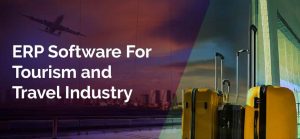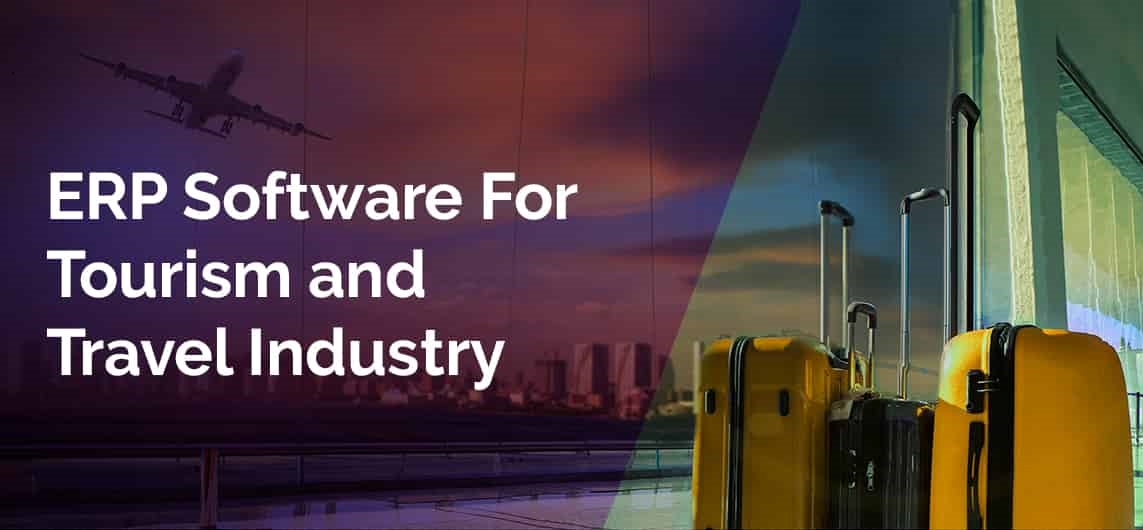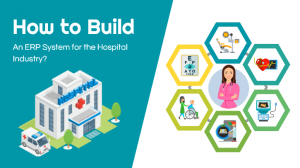ERP for Tourism Sector – People who travel are frequently looking for an experience or a memory to appreciate. As a result, client retention equals customer pleasure in the tourism sector. They want a flawless experience, and ERP systems may help you achieve that and more without a hitch.
What is the need for ERP for Tourism Sector?
The need for an Enterprise Resource Planning that can manage all back-end processes and relieve employees from their rigorous schedule is critical. An ERP can give the user a quick summary of transactions, budgeting, and customer relationships. It can promote smooth contact with suppliers, vendors, and other third-party agents.
Let’s get right to the point and see how a cloud-based ERP system may alter your travel organization.

Managing Leads with ERP for Tourism Sector
An ERP management system may streamline all inquiries and follow-up activities for the tourism sector. The entire client lifecycle may be tracked, allowing weaknesses in the system to be identified and addressed as soon as possible.
Finances
Tourism companies can relieve complex financial functions from the shoulders of travel agents by automating repetitive procedures such as creating invoices, receipts, financial statements, and more through an ERP Software, allowing them to focus more on client satisfaction.
Third-party Management
Role-based access aids in the streamlining of information across departments and external entities. This means that when data is updated anywhere in the system, it is automatically updated in all relevant entities. It also encourages interaction across many channels and results in higher ROI.
Reporting with ERP for Tourism Sector
Most tourism businesses lack a central dynamic system capable of auto-generating vital reports for the organization. Tour reports, staff performance reports, Fixed Asset Management reports, and account reports are regular in the sector. The requirement for a centralized database that can generate customized essays will be a significant benefit.
Itinerary
Creating an itinerary is critical to ensuring customer happiness. Many ERP systems can create itineraries in a standardized format, allowing travel agents to have a ready-to-go itinerary section without drilling down into intricate details.
Quotations
Customizable quotations enable travel agents to make swift judgments in real-time. The flexibility to select from several quotation formats will assist agents in making faster and more informed judgments that will best fit the consumer.
Omni-channel Promotion
Marketing is unavoidable in this sector, and tourism companies give discounts and promotions to customers. However, it is critical to determine whether all promotional initiatives reach the intended audience. Numerous ERP systems support omnichannel promotion elements, such as email, Whatsapp, and other social media.
ERP Checklist for Travel Sector
So here are some things that tourist companies should keep in mind before investing in travel ERP Project Management.
1. Automation
There is no space for error in the business world, so it is critical to look for ERP solutions that can achieve this. Challenging repetitive processes can be easily automated to eliminate mistakes and increase efficiency.
2. Accessibility
The next priority is user-friendly interfaces. This is due to the complexity of diverse ERP software, and it might take months or years to fully understand the software’s capabilities. Employees should be able to get a rapid overview of their workflow without having to sift through mountains of data. As a result, search for ERP software that is simple to use.
3. Data Security
Your system most likely consumes a lot of data and thus requires a security solution that will protect all of your data. Don’t skimp on data security when looking for a low-cost ERP system.
4. Scalability
The actual cloud experience is all about expanding as per your requirements and, as a result, keeping a tight grip on your budget. Because of budget constraints, many small and medium-sized tourism enterprises overlook ERP systems. However, the cloud democratizes ERP solutions for all types of enterprises.
NetSuite ERP for Tourism Companies
So far, we’ve discussed the benefits and functionalities of generic ERP software Business Process Mapping . Now let’s dive into the ocean of Netsuite benefits for Tourism Companies.
Netsuite Financial Management is advanced, providing real-time visibility into multiple financial processes such as order to cash, payables, and receivables. Netsuite Oneworld also supports multi-currency transactions and standardizes all of your business processes.
Netsuite’s inventory management is faultless, with the ability to track stock levels based on volume, category and further replenish the stock by forecasting future demands. Companies may dramatically reduce waste by precisely controlling stock levels.
Netsuite Oneworld’s Entity Management can monitor local, regional, and multinational operations. Simplify all of your global business procedures while maintaining legal and financial adherence.
Netsuite’s Human Resource Management module helps you manage all aspects of employee compensation and benefits. The company also provides HR analytics to help you analyze the performance of your employees, as well as give you a 360-degree view of what you’re doing right and wrong.
Fixed Asset Management is frequently required for travel companies with significant automobiles or other in-house machinery fleets. Netsuite assists in tracking the asset lifespan and reporting the asset’s status from procurement to disposal.
Do you desire Travel ERP software? Request a quotation from Connected IT Consulting Services, an Ireland-based company that specializes in ERP implementation & other business process-related services.
Related Links
ERP Project Management
Business Process mapping
Small Business ERP
ERP Consulting



